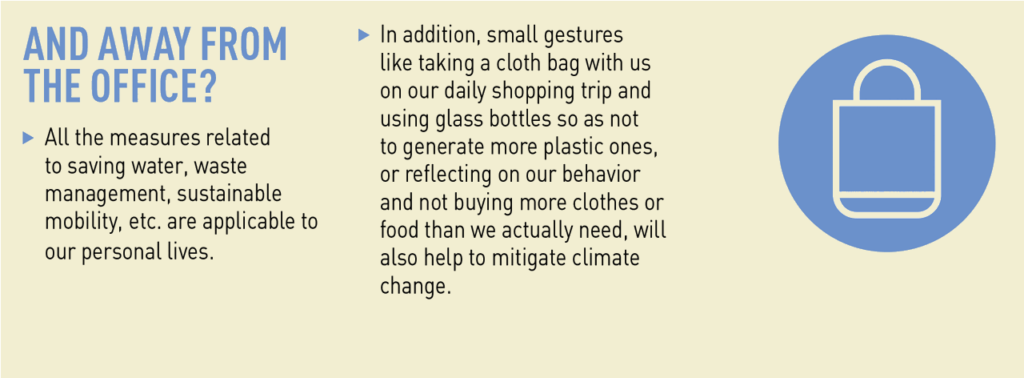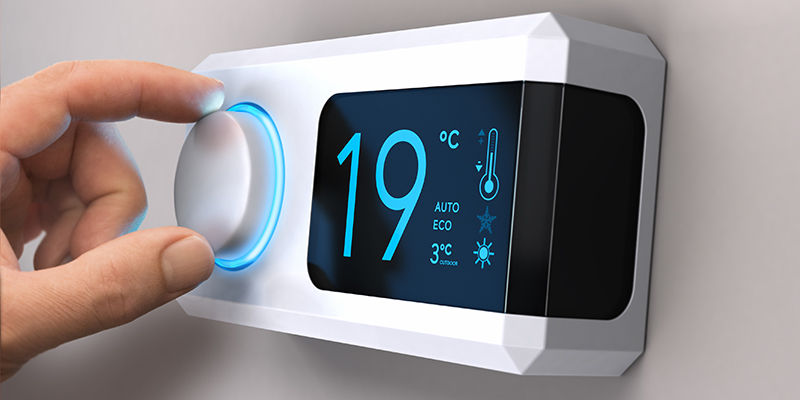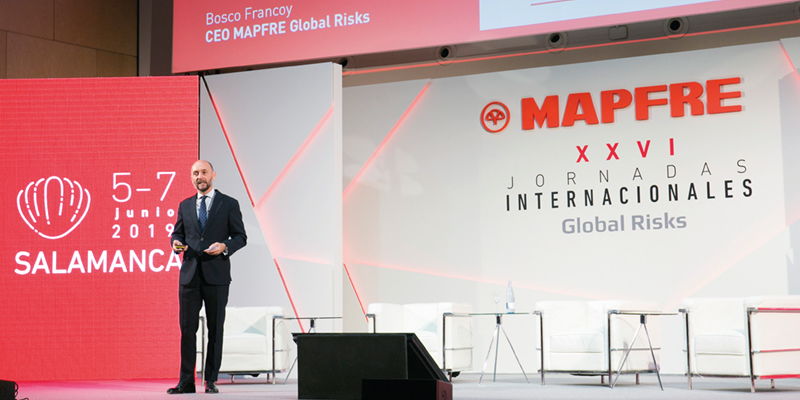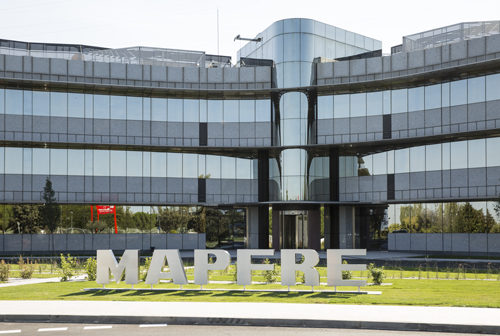We show you small everyday gestures that can help improve our planet.
TEXT MAPFRE | IMAGE ISTOCK
You have no doubt heard of the Friday for Future movement that has brought hundreds of thousands of students around the world onto the streets to demand their governments act now to tackle climate change. Among their demands is the need to curb the emission of greenhouse gases (GHG), responsible for the rising temperatures on the planet. For some time now, MAPFRE has been adopting measures to mitigate their effects. Indeed, MAPFRE’s Chairman and CEO, Antonio Huertas, recently announced that our public commitment on GHG emissions neutrality has been brought forward, namely that MAPFRE will be a carbon neutral company, worldwide, by the year 2030.
But what can you do? In this article we will give you a few small tips to improve your habits as regards water, energy and waste management, your mobility and consumption habits etc. Keep reading, take heed and share your ideas. All together, we can achieve a great deal.
Let’s start with water, without which we cannot live
Water resources are a truly critical issue for the future of our planet, since the availability of drinking water is directly threatened by the consequences of climate change.
Well aware of this reality, MAPFRE is committed to comprehensive, sustainable water management at all its facilities. It has introduced management programs and measures designed to optimize and reduce water consumption without compromising on comfort, while ensuring that the waste water generated at our facilities complies with the quality standards required by current legislation.
Efficiency, technology, design, regulations, consumption control and responsibility are just some of the factors MAPFRE takes into account when it comes to effectively managing its facilities and those activities that require water.
What can you do?
- Use water in a responsible manner and, if you detect any leakage or malfunction. Inform the personnel responsible for its repair.
- Do not use the toilets and drains as trash cans.
Energy management
The sustainable use of energy has become one of the greatest challenges facing humanity today.
Promoting and disseminating the principles of a new energy culture – based on responsible energy use and management – is one of the commitments set forth by MAPFRE in its Environmental Policy, which is committed to energy savings and efficiency to drive green growth within a low-carbon economy. This document can be consulted on the Global Intranet.
Innovation, energy efficiency, renewable energy and eco-efficiency, together with the optimization and promotion of best sustainable practices, are just some of the factors that MAPFRE takes into account when identifying and managing its energy-related questions, without detriment to the degree of comfort and quality of the interior of its facilities.
What can you do?
At the end of the workday use the “suspend” option on your computer and switch the monitor off. This power-saving mode allows you to restart your pc in a matter of seconds. In addition, remember to unplug any chargers you are not using.
Refrain from adjusting thermostats within your reach and ensure all air vents are unobstructed.
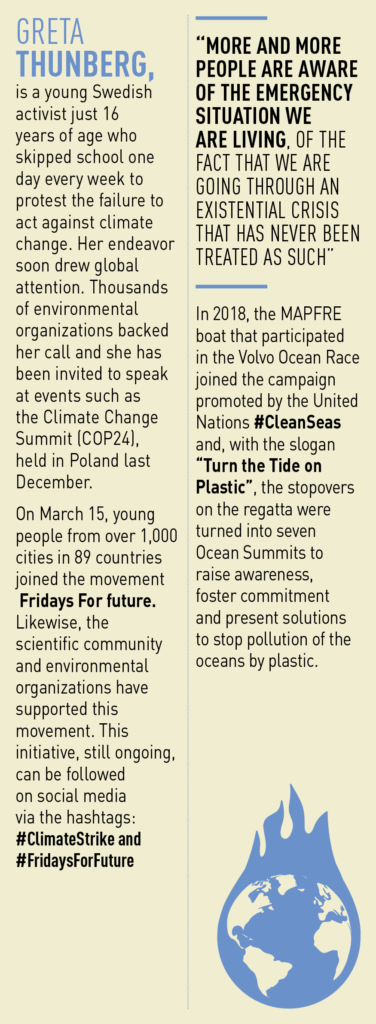
Waste management
One of the most serious problems facing our planet is the generation and inadequate management of waste. MAPFRE has established guidelines for managing the waste produced as a result of its activity in an efficient, optimal manner. These prioritize such aspects as pollution prevention and the optimum use of resources, above and beyond strict compliance with any applicable legislation.
Prevention, reuse, recycling and energy recovery, together with the regulations, responsibility and encouraging good practices, are all factors included in the design and logistics of the waste management systems implemented at MAPFRE. Accomplishing the correct implementation of all these aspects calls for the full participation and involvement of each one of us in this company.
What can you do?
Collaborate by depositing each waste item in the correct container clearly identified for this purpose. In this way you will facilitate its subsequent processing and recycling. Any doubt you have should be addressed to the environmental officer in your company or building.
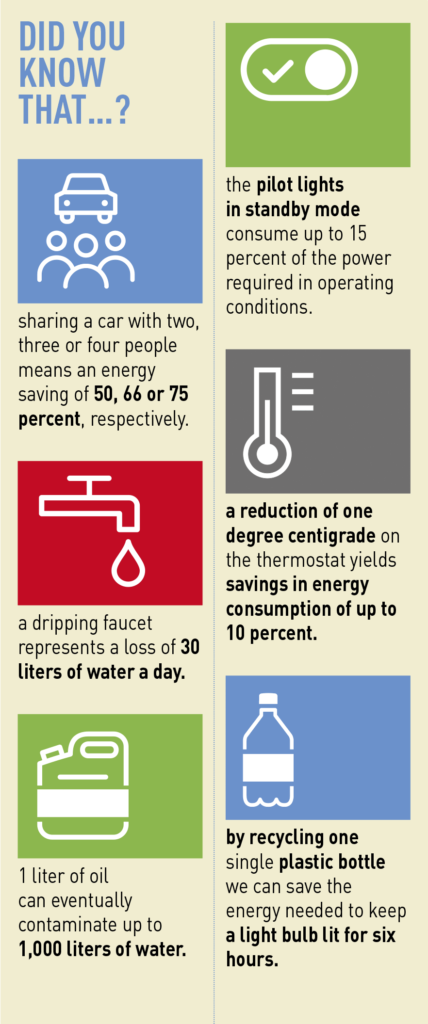
Managing atmospheric emissions
Air pollution resulting from economic development is the leading cause of global warming and the principal threat we face now and will face in the future. A reduction of greenhouse gas emissions calls for a business management approach that allows for MAPFRE’s resilience to be enhanced in future scenarios.
MAPFRE’s processes for mitigating and adapting to climate change, with actions designed to reduce the Group’s carbon footprint, are outlined within the Strategic Plan for Eco-Efficiency and Climate Change (which is available on the Global Intranet).
What can you do?
- Refrain from adjusting thermostats within your reach and ensure all air vents are unobstructed.
- Solely make those trips which are strictly necessary, replacing them whenever possible with videoconferencing.
Responsible consumption and green purchasing
Responsible consumption and green purchasing are economically viable, as well as socially fairer and more equitable. The inclusion of sustainability criteria in the acquisition of materials, products, services and/or hiring of providers affords MAPFRE a tool it incorporates when assessing economic and technical aspects, and analyzing the environmental impact throughout their life cycle.
In this way we foster competitiveness among enterprises, as well as innovation, encouraging manufacturers and providers to incorporate the best practices available.
What can you do?
Print out only when strictly necessary using the toner-save options on your printer.
Sustainable mobility
Transport is one of the principal activities related to environmental pollution and climate change, due to the high consumption of fossil fuels and the consequent emission of greenhouse gases into the atmosphere. The location of work centers and the predominant use of private vehicles do not help when it comes to minimizing the environmental impact of employees commuting to work. For this reason, MAPFRE has launched initiatives designed to achieve more sustainable mobility: the use of collective means of transport, an increase in the shared use of private vehicles, as well as the promotion of environmentallyfriendly vehicles.
What can you do?
Whenever possible, use public transport.
Optimize the capacity of your car, keep your vehicle properly serviced and drive efficiently.
If you are going to buy a new car, opt for a low-emission or electric vehicle, given the direct correlation between fuel consumption, greenhouse gas emissions and, increasingly, the associated taxes.
